MORE PICS-POPE Benedict & The QUEEN CHRISTMAS Messages are ALL in Vain; How many would heed their Appeals without Enlightenment & See Beyond the MIND?
At the Heart of All Religions is the Same Truth
That's why many of us cannot understand that one religion is no different than the next, it’s because of the mind. Perhaps, we are not that enlightened to go beyond the mind. Then we see differently, and truly understand that there’s no difference, ever. It's such a simple thing we shake our heads and can’t believe that we couldn’t understand it before.
It's alright if each of us can pursue what he or she wants to study and believe, whether false or true. But the problem comes when we start to ARGUE and FIGHT among each other because of philosophical differences. Then we truly disgrace ourselves and our ascended Teachers because they always preached peace, integrity and love.
Thus, it doesn't matter now whether we believe that Christianity is the greatest religion, Islam is the right path or that Buddhism is the highest belief system in the world; we don’t need to argue. Instead we should seek to know our true religion, the true religious essence, which Buddha left behind, which the Teacher of the Tao left behind, which Christ left behind and what is stated in the Koran. And then we’ll know that the only, the best and the quickest way are through enlightenment.
Curiosity is a
Most of us have many questions, and it doesn't matter how many answers we get, we still have more questions. When we were young, we asked our parents many questions. Some were never answered, and as we grew up, we asked our teachers, friends and various wise people many questions, as well, some of which were also never answered. There will still be many questions about very unimportant issues and it may take a long period of time to understand them.
Some questions that we ask ourselves and try to attach ourselves to are very unimportant, and this makes trouble for us. But it doesn't matter because sooner or later all these concerns will fade away. As we grow higher into spiritual maturity, we become calmer and more placid in our thinking and viewpoint on life. So when people come and ask many questions, we always try our best to satisfy them, but it’s still difficult for some to understand the answers despite our best intentions. It’s because they’re using their limited understanding to try to grasp something that’s beyond it.
It seems that they can never get enough answers, but that’s the way the mind is. We always feel curious because the mind is always inquiring; that's why it collects a lot of information each day, whether bad or good. But the mind doesn't have the power of discernment. And most of the misery, dissatisfaction, prejudice and discrimination among us and with various subjects in life comes from this inquisitive nature of the mind, which takes in all kinds of data, possesses it and makes it become its own.
We Should Consider Carefully before Believing
So we should be careful about what we read and what we hear because if we don’t select discriminately, other people's ideas, theologies or philosophies, which are sometimes not quite correct, will sink into our minds and become our own. And we’ll think it’s we who think this way, who accept this, that and the other. Then later, when other information comes to us that are more correct and more helpful, we reject or doubt it because we’ve already recorded some idea or theory that seems contradictory to the new data.
And this is one of the problems we encounter in our lives and in the world that has produced or given birth to many things, such as hatred, discrimination and conflicts between religions, between nations, between neighbors and between people. So whatever theories, teachings or ideals we take in, we should first or at least later examine as to whether they have any grounds, any use in our daily life or for our spiritual progress. Otherwise, we’ll have a lot of trouble struggling between different ideals, groups or systems of thought.
There’s nothing that we should take on faith without consideration or proof. We need to prove everything, even spiritually because it’s a science. It’s the highest science, but it’s still a science. The Masters of the past, present and future are those scientists who know many things about the universe that we ordinary people probably find difficult to understand or believe. But then they also teach us or guide us into this science so that later we ourselves also become a master or teacher, at least of ourselves because to be master of ourselves is the most difficult task. And to be able to do that, we must have the strongest power, which is the power of God or the universal intelligence that we’ve had all along.
When He was alive, some people accused Jesus of telling lies and being blasphemous because He said He was one with God, that He was the son of God and that He and the Father were one. But we’ve forgotten, and even nowadays people still think this way. We’ve forgotten that except for God, there’s nothing and no one else who lives within this temple.
The Soul Never Reincarnates
The "I" that we assume ourselves to be never really existed because when we’re first born, we don't know much and we don't even have a name. So we don't even have the "I" because if you boil it down to the "I" that exists from the time we’re babies, what is it that you call the "I" or the "her," or the "she" or the "he"? What is it? Can you identify a baby with any entity that we call the "I” or the "he" or the "she"?
When we grow up, we get a lot of knowledge from teachers, relatives or friends and then we begin to have an identity, to become an individual, perhaps one who’s described as an angry person, an irritated character, a loving person or a wise person. But where do these wise, loving, angry, lustful or greedy individuals come from? We weren’t born with them; they weren’t the “he” who was born in the beginning. They’re only the input that we collect and then identify ourselves with.
So we don't have an identity that reincarnates. Perhaps what reincarnates is this tendency to cling to the information that we got, whether bad or good. And then that clinging tendency goes and finds one instrument after another to satisfy the longing that we haven’t gotten from the previous so-called birth.
So after the knowledge, wisdom or God Self that resides in this body passes out of or leaves this temple, he, she or it will pass to another temple. Just like when we go from one church to another, we’re the same person. And actually, in the universe there’s no one entity that exists but a whole mass of energy in a loving field, sometimes just divided into different sections.
Similarly, we’ve never been separated from the most High, the highest power. We’ve always been the Supreme. But because of our tendency to identify with the information we get and the habits we collect from the environment and from our circumstances, we have an individual, an entity that thinks of itself as separate from the whole.
So after we’re enlightened, either through our own effort or through a spiritual friend we can see things differently. Then, even though we still have an individual shell, we know we aren’t that, and at that time, all our answers appear naturally, or we don't have any more questions. That's the best way because no question is a good question! When we’re enlightened, we rise above this position of bad and good, of the discriminating nature of the mind. And then we see: “Ah! That was just my shell, my clothing. I’m here, me.” It's different.
The more we identify ourselves with material knowledge and possessions, the less we know how great we are. Some who have a lot of intellectual knowledge find it harder to meditate and harder to attain the higher wisdom than less educated simple people because these people have less to wash away, less to disentangle or “un-knot.” Just like with our house, when there are too many things inside, it takes a longer time to clean it up in order to bring in new furniture. But if we only have a few things, it’s quicker.
Be Friends with Your Mind
So it’s very easy to believe that we can get liberated in one lifetime because actually we’re already liberated. We’ve always been liberated, and we will always be liberated. What makes us feel bound and un-free is the tendency to clutch onto the mass of knowledge or habits that we call "I" so that we forget to look at the real thing. Actually, the enlightened people or the brilliant, higher-level people don't need a lot of lecturing or explanation. Just one word or one sentence is enough, and that’s also a kind of sudden enlightenment.
We’ve always been enlightened, and we always are enlightened. It’s just in a little bit of obscurity, that’s all. It’s not easy to bring home these abstract ideas with simple, ordinary words. But when we understand this, it’s deep inside us and becomes part of us, and we feel very easy and elated.
But that’s one of the intellectual enlightenments only. In Zen meditation, they sometimes call it “sudden enlightenment” or “immediate enlightenment” because one word from the teacher can set you free in part, or maybe set you free a great deal or completely. Then why do we have to meditate after we’re enlightened or after we’ve already understood what the Master or Teacher wanted to say? It’s because we have too many habits and too much knowledge from the past; so one time isn’t enough to convince us that we’re enlightened. We’ll probably forget it tomorrow or the next day.
Thus we need to repeat the experience of enlightenment again and again until our mind also accepts it. It's not enough that the soul, the real Self, recognizes itself because the Self has always known the Self anyway; our Great Self already knows itself. But because we’re in this world, we have to do everything with an instrument; that is, the mind or the computer. That’s the tool we have to use for working in this world, for bringing the blessing and power of love into our chaotic environment in order to make a better world for our children and many generations to come.
The mind is a very powerful instrument; it’s what hinders us life after life so that we can’t know God and can’t know our real position in the universe. So we cannot overlook the mind; we must befriend it. We must let it know why we do this and why we do that until the mind completely accepts and becomes our good friend; then we can be very happy and relaxed. Otherwise, if the mind doesn't agree, we can forget about meditation. It won't yield any fruit because you sit in meditation and it keeps asking you questions: “Why do you sit? What for? I want to go to the movies or see a girlfriend. Why are you sitting here like an idiot? Coffee is better and cake is nice”—all these kinds of things.
So apart from transmitting the silent knowledge of the real enlightenment, spiritual teachers still have to give oral teachings to the people in order to satisfy the inquiring nature of the mind. The mind is always asking questions and weighing things because the input that it received before contradicts the data it’s receiving now, or it may not even understand the new information but it says it's not the same.
That's why many of us can’t understand that one religion is no different than the next. It’s because of the mind. After we’re enlightened, however, we go beyond the mind. Then we see differently, and truly understand that there’s no difference, ever. It's such a simple thing that after enlightenment we shake our heads and can’t believe that we couldn’t understand it before. It’s as easy as seeing each other now, but we couldn't see each other without enlightenment. That’s a very, very complicated situation created by the king of illusion to keep people in darkness. After you’re enlightened, you’ll be very surprised to discover many times that so simple a thing, something that’s so easy to understand, you were never able to understand before.
The teachings of the Teacher, Master or spiritual friend are called oral teachings, which are the theoretical part of spiritual practice. But the more important part is the one that’s transmitted in silence twenty-four hours after the Teacher has accepted a person as His new younger friend or new student.
So the theoretical teaching of any Master, past, present or future is just a small part of the whole. If we only learn the theory, we can get somewhat enlightened, or we might at least become an ethical person. For example, we’ll understand the need to keep the precepts, to spread love instead of using violence, to share with our neighbors instead of stealing and so on. But after a Master passes away, the theoretical teachings are unavoidably left behind in the records of disciples or other people who attended His sermons. And the later generations lean on this recorded information, perhaps in order to practice or have guidelines about what to do to find God. Because of their thirst for knowledge, they grasp at anything in order to understand God, and from that, religions begin to form.
====== = = = = ==
Pope Benedict said in his Christmas message on Monday that mankind, which has reached other planets and worships technology, cannot live without God or turn its back on the hungry. It was shameful that in "this age of plenty and unbridled consumerism" many remained deaf to the "heart-rending cry" of those dying of hunger, thirst, disease, poverty, war and terrorism. In his "Urbi et Orbi" (to the city and the world) message, he made a heartfelt appeal for peace and justice in the Middle East, an end to the "brutal violence" in Iraq and a solution to fratricidal conflicts in Darfur and other parts of Africa.
The Queen has called for more understanding between generations in her Christmas message. The monarch, who turned 80 this year, said the elderly need to be shown respect and young people need to be "nurtured and guided" .Her message - broadcast at 1500 GMT on radio, TV and online - said that young and old of all faiths have much to offer each other. Earlier, the Queen attended a service with other royals at
Pope Benedict's Christmas message
Pope Benedict ushered in Christmas at
"The child of
May they all experience the light of love, which mankind needs so much more than the material necessities of life." The Catholic Church, particularly in the
The Pope, wearing resplendent gold and white vestments, again spoke out against the materialism that he has said several times has been allowed to dominate Christmas. "During the festive meals of these days let us remember the Lord's words: 'When you give a dinner or a banquet do not invite those who will invite you in return, but invite those whom no one invites and who are not able to invite you'," he said. "This also means when you give gifts for Christmas do not give only to those who will give to you in return but give to those who receive from no one and who cannot give you anything back." A member of the congregation read a prayer in Arabic asking God to encourage "a spirit of dialogue, mutual understanding and collaboration" among followers of the three great monotheistic religions - Christianity, Judaism and Islam. On Monday at 1100 GMT the Pope will deliver his traditional, twice-yearly "Urbi et Orbi" [to the city and the world] message and blessing to crowds in St. Peter's Square. At his traditional Sunday address from the window of his apartments, he urged the world not to shut Christ out of Christmas and to banish prejudices hindering peace. "May his birth not find us busy celebrating Christmas forgetting that he [Jesus] is the very person at the centre of the feast," he told thousands of pilgrims and tourists. He urged that the many people who would spend Christmas "in solitude, in sickness and in suffering" should be remembered. The real spirit of Christmas was a commitment to overcome prejudices, break down barriers and eliminate situations that pitted individuals and people against each other in order to build a world of justice and peace together, the Pope said.
= = = = = == = =
Published:
"I have lived long enough to know that things never remain quite the same for very long. One of the things that does not change all that much for me is the celebration of Christmas. It remains a time when I try to put aside the anxieties of the moment and remember that Christ was born to bring peace and tolerance to a troubled world. "The birth of Jesus naturally turns our thoughts to all newborn children and what the future holds for them. The birth of a baby brings great happiness but then the business of growing up begins. It is a process that starts within the protection and care of parents and other members of the family, including the older generation. As with any team, there is strength in combination. What grandparent has not wished for the best possible upbringing for their grandchildren, or felt an enormous sense of pride of their achievements? But the pressures of modern life sometimes seem to be weakening the links which have traditionally kept us together as families and communities. "As children grow up and develop their own sense of confidence and independence in the ever-changing technological environment, there is always the danger of a real divide opening up between young and old, based on unfamiliarity, ignorance or misunderstanding.
"It is worth bearing in mind that all of our faith communities encourage the bridging of that divide. The wisdom and experience of the great religions point to the need to nurture and guide the young and to encourage respect for the elderly. Christ himself told his disciples to let the children come to him, and
People of different faiths are bound together by the need to help the younger generation to become considerate and active citizens. "And there is another cause for hope that we can do better in the future at bridging the generation gap. As older people remain more active for longer, the opportunities to look for new ways to bring young and old together are multiplying. "As I look back on these past 12 months, marked in particular for me by the very generous response to my 80th birthday, I especially value the opportunities I have had to meet young people. I'm impressed by their energy and vitality, and by their ambition to learn and to travel. It makes me wonder what contribution older people can make to help them realize their ambitions. "I am reminded of a lady of about my age who was asked by an earnest little granddaughter the other day: `Granny, can you remember the Stone Age?' Whilst that might be going a bit far, the older generation are able to give a sense of context as well as the wisdom of experience which can be invaluable. Such advice and comfort are probably needed more often than young people admit or older people recognize. "I hope that this is something that all of us, young or old, can reflect on at this special time of year. For Christians, Christmas marks the birth of our saviour. But it is also a wonderful occasion to bring the generations together in a shared festival of peace, tolerance and goodwill. I wish you all a very happy Christmas together."= = = == == == = =
By Jonathan Saul
BETHLEHEM, West Bank (Reuters) - Hundreds of pilgrims celebrated Christmas in
Palestinian President Mahmoud Abbas attended the traditional
(REUTERS/Eliana Aponte) "We need peace even more now," said Hanna abu Eita, a 60-year-old Christian. "We only want a chance to live." Local officials said some 8,000 to 10,000 pilgrims would visit
At the
Crowds of well-wishers (ABOVE) gathered outside St Mary Magdalene's Church to offer flowers and Christmas tidings to the royals.
ABOVE: Prince Charles and the Duchess of Cornwall and BELOW, escorting the princess Royal
ABOVE: Princess Beatrice, Princess Eugenie, the Princess Royal
Most of the royal party walked to church from nearby Sandringham House. After church, Christmas lunch featuring a giant turkey reared at
ABOVE: Zara Phillips BELOW: Princess ANN
There was extra security in place at the church on Sunday as the Queen attended a Christmas Eve service. The royals have a well-trodden Christmas routine which starts with the opening of their presents on Christmas Eve. After a black-tie dinner in the evening, the corgis are led out and the ladies adjourn, leaving Prince Philip to serve port or brandy to the men.
On Christmas morning, the Royal Family awake to stockings filled with small gifts and fruit at the foot of their beds.
= = =
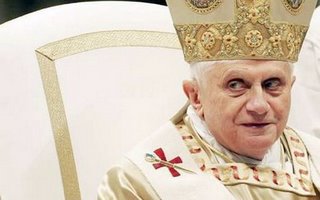



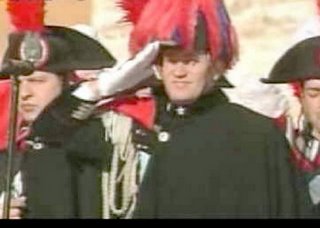
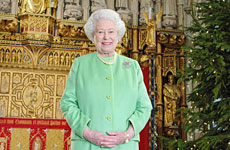


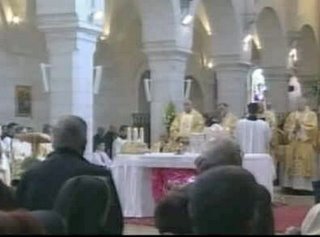






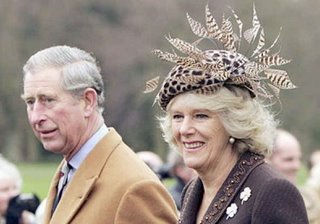

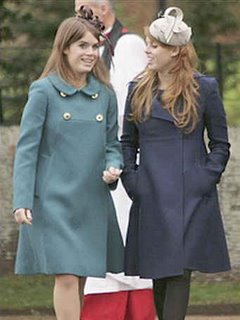
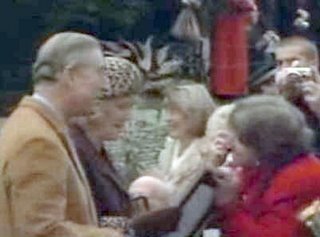






0 Comments:
Post a Comment
<< Home